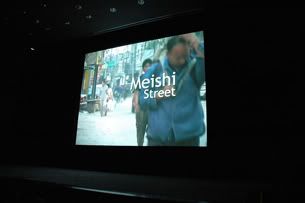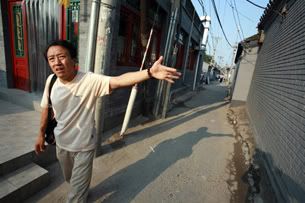
Last week I had the opportunity to attend the screening of Meishi Street held by the UT Documentary Center. The Director, Ou Ning, was there for Q&A afterwards as well.
At first, I didn't know what to expect from the film. I thought it was going to be about a large group of people and their revolt against their government. Those expectations were more or less met but the film was primarily centered around one character named Zhang Jinli and the struggle himself and his neighbors were going through to keep their property. Here is a picture of Jinli:

Their struggle began because their government wanted to demolish their neighborhoods to build a highway in time for the 2008 Beijing Olympics. Sounds pretty awful, huh?
This film depicted the fall of dozens of families and painted a very depressing portrait of what life under that kind of government can be like. Nonetheless, the film in it's entirety was very beautiful and interesting to it's audience. The camera was hand-held and there was no musical score. This made it feel very real which only added to the depression factor.
At the end of the screening, the director Ou Ning gave his insight on what it means to protest in China using characters and signs rather than starting a mob and he also told us why he started the projects in the first place. I had to leave the Q&A session a bit early, though.
In conclusion, a good film that teaches a lot about contrast in culture and government. check it out. -pruitt
1 comment:
I was also able to attend this outside screening of Meishi Street. The film depicts the demolition of Meishi Street to widen the streets for the recent Beijing Olympics, displacing the majority of residents from their homes without proper plans for temporary or long-term housing. At first glance, you will see that the production values are low, shot on a handheld mini-cam and edited quite simply. This was explained by director Ou Ning. Because of the heavy tourism in Beijing, police officers permit the use of mini-cams for tourists. If they know you are not a tourist and are carrying heavy production equipment, they will most likely confiscate it as this kind of dissent is illegal in China. He expressed that the film was actually very hard to make because of this. Most shooting was covert and the film itself puts Ning in danger with the Chinese government. He did mention that he was able to screen the film in China after some time, but the demolition of Meishi St. continues. This film represents the power of the mini-cam that many activist groups like WITNESS elude to. It stands as visible evidence to human rights violations in China and has spurred a social movement both in China and internationally.
Post a Comment